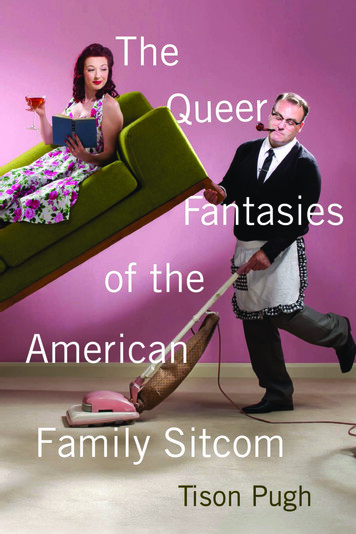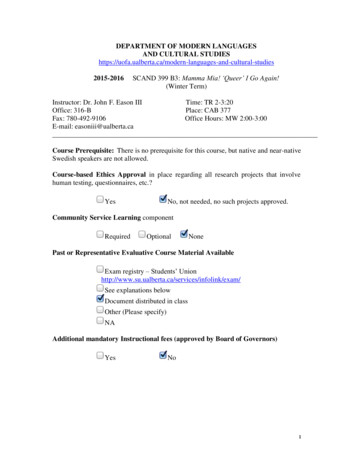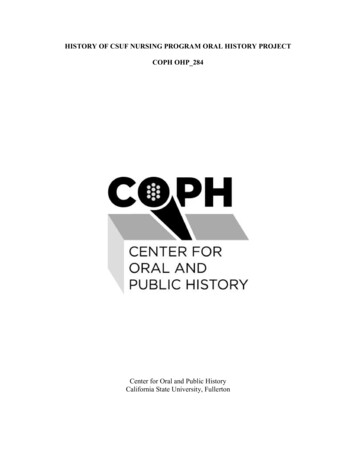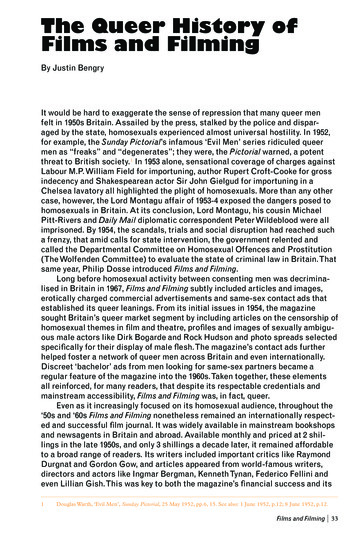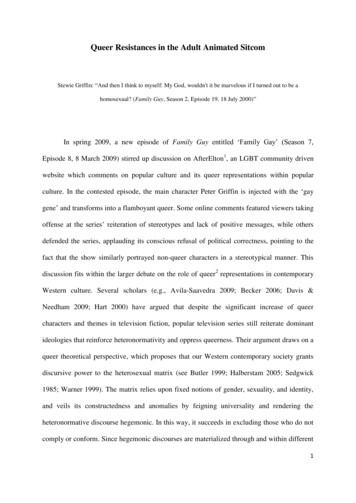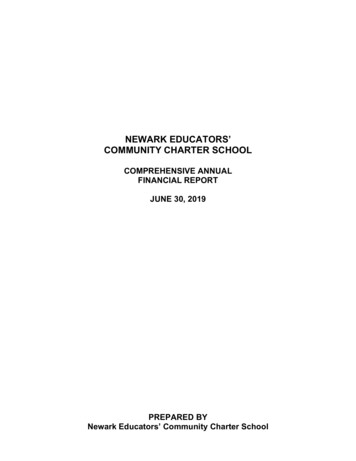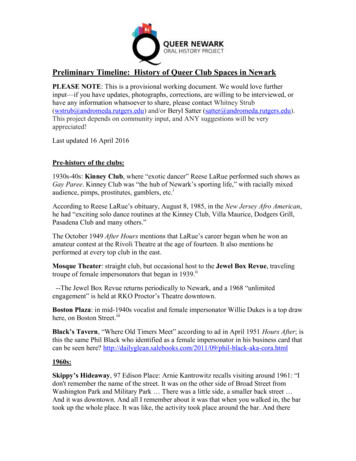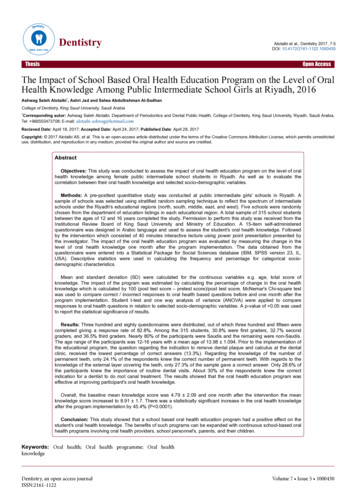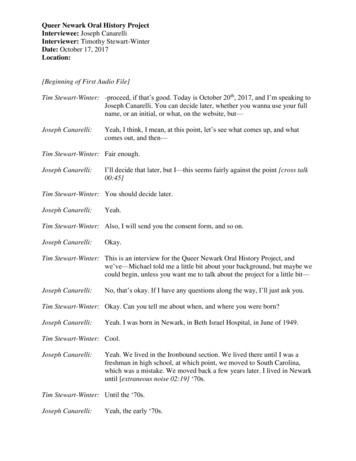
Transcription
Queer Newark Oral History ProjectInterviewee: Joseph CanarelliInterviewer: Timothy Stewart-WinterDate: October 17, 2017Location:[Beginning of First Audio File]Tim Stewart-Winter: -proceed, if that’s good. Today is October 20th, 2017, and I’m speaking toJoseph Canarelli. You can decide later, whether you wanna use your fullname, or an initial, or what, on the website, but—Joseph Canarelli:Yeah, I think, I mean, at this point, let’s see what comes up, and whatcomes out, and then—Tim Stewart-Winter: Fair enough.Joseph Canarelli:I’ll decide that later, but I—this seems fairly against the point [cross talk00:45]Tim Stewart-Winter: You should decide later.Joseph Canarelli:Yeah.Tim Stewart-Winter: Also, I will send you the consent form, and so on.Joseph Canarelli:Okay.Tim Stewart-Winter: This is an interview for the Queer Newark Oral History Project, andwe’ve—Michael told me a little bit about your background, but maybe wecould begin, unless you want me to talk about the project for a little bit—Joseph Canarelli:No, that’s okay. If I have any questions along the way, I’ll just ask you.Tim Stewart-Winter: Okay. Can you tell me about when, and where you were born?Joseph Canarelli:Yeah. I was born in Newark, in Beth Israel Hospital, in June of 1949.Tim Stewart-Winter: Cool.Joseph Canarelli:Yeah. We lived in the Ironbound section. We lived there until I was afreshman in high school, at which point, we moved to South Carolina,which was a mistake. We moved back a few years later. I lived in Newarkuntil [extraneous noise 02:19] ‘70s.Tim Stewart-Winter: Until the ‘70s.Joseph Canarelli:Yeah, the early ‘70s.
Tim Stewart-Winter: Okay. Where did you move in the early ‘70s, just so I have a sense of thearc?Joseph Canarelli:I moved to Brooklyn. I lived in Brooklyn for one year, and then I movedto the East Village. I lived in the East Village for over 30 years, beforemoving here to Seattle.Tim Stewart-Winter: Great. Can you tell me a little bit about your family?Joseph Canarelli:My family?Tim Stewart-Winter: Yeah.Joseph Canarelli:I’m having a little bit of trouble hearing you.Tim Stewart-Winter: Oh, I’m sorry.Joseph Canarelli:Yeah, it’s okay, I’m just—Tim Stewart-Winter: Is this a little better?Joseph Canarelli:You sound just a little distant, but I’m getting what you’re asking, so it’salright. You wanna know about my family—Tim Stewart-Winter: Your family of origin, you know—Joseph Canarelli:Yeah, both my parents are first-generation, born in the United States. Allmy grandparents come from Italy, came from Italy. My maternalgrandmother was three years old, when she came to The States. Mypaternal grandfather was somewhat older. They all immigrated at differentages, and they all settled in Newark.Tim Stewart-Winter: Did you have siblings?Joseph Canarelli:I have a younger sister. She’s three years younger, and that was it. It wasjust the two of us.Tim Stewart-Winter: Gotcha—Joseph Canarelli:Yeah, we were [inaudible 04:19]Tim Stewart-Winter: What did your folks do for work?Joseph Canarelli:They were a working-class family. My father worked in a factory, or anumber of factories, that manufactured light bulbs. He repaired2
machines—he was a repair mechanic, I guess you would call it. Herepaired machines that made light bulbs. My mother was what used to becalled a clerk typist. I don't know what—I don’t even know that that sortof position even exists anymore, and certainly, I don't know what that kindof a level of job would be called, nowadays. She worked for decades forthe Prudential Insurance Company, which was in downtown Newark,when I was growing up.Tim Stewart-Winter: Cool.Joseph Canarelli:Yeah.Tim Stewart-Winter: I’m just curious about the light bulb factory. Was that in Newark, too?Joseph Canarelli:Yes. I don’t remember where. I can see it in my head, cuz daddy took meto work one day, but I don’t remember where it was.Tim Stewart-Winter: Were they religious? Did you grow up going to church?Joseph Canarelli:Yes. My queerness extends to religion, in a way, also. We werePresbyterian. We were not Catholic. My father was raised Catholic. Mymother was raised Presbyterian, and that [cross talk 06:22] had somethingto do with when they moved to the Ironbound. My mother was a really,really little girl. There was a congregation there of Italian Presbyterians—Tim Stewart-Winter: Oh, how interesting.Joseph Canarelli:-who knew? Where did they come from? This is a question that I don’thave an answer to, but there they were. The minister of this congregationdid a lot of outreach to my grandmother, and she decided to convert. Theybecame Presbyterian. When my parents married—you know, religion isoften carried by the maternal, and female side of the family, anyway, andthat’s very much what our story was. For my father, who had been an altarboy, it didn’t seem to matter much, so he converted, as well—Tim Stewart-Winter: Fascinating.Joseph Canarelli:-we were raised Presbyterian, and our church, which, I see, is still inNewark, on Broad Street— it was Old First Presbyterian Church.Tim Stewart-Winter: Old First?Joseph Canarelli:That’s what it was called, yeah.Tim Stewart-Winter: It may be. I confess, I don’t know. I’ll look it up.3
Joseph Canarelli:Yeah, it was there. It had been there for like 200 years, or something?Yeah, but it was called Old First Presbyterian, and it was on Broad Street.Tim Stewart-Winter: You grew up going to church there?Joseph Canarelli:Yes.Tim Stewart-Winter: Your maternal grandmother, it sounds like, also grew up in Newark, is thatright?Joseph Canarelli:Yes.Tim Stewart-Winter: Interesting. In the Ironbound?Joseph Canarelli:That’s a good question. I don't know where grandma—I don’t know whereher family lived in Newark—Tim Stewart-Winter: Fair enough.Joseph Canarelli:Yeah, I don't know.Tim Stewart-Winter: Tell me a little bit about your childhood, or can you describe an earlymemory?Joseph Canarelli:An early memory. That’s a big question. That’s very broad, Tim. Earlymemory—Tim Stewart-Winter: Well, let me ask a different question—Joseph Canarelli:I can give you a little narrative, sort of, about my childhood, as Iremember it, like beginning first couple of grades in school—Tim Stewart-Winter: That sounds perfect.Joseph Canarelli:Alright. They were, as I recall, completely uneventful, til about the thirdgrade, at which point, I started getting hassled about being a sissy. That’swhen it began.It seems like—it’s almost like two stories, in my head, in a way, becauseup until third grade, I remember just sort of being left alone. Not shunned– left alone, but I wasn’t being bullied, or what’s nowadays called bullied.I wasn’t being hassled. I wasn’t being harassed. Then, it seems, quitesuddenly, in third grade, either I started becoming more effeminate, orsuddenly, that became more important [cross talk 10:30]Tim Stewart-Winter: Fascinating.4
Joseph Canarelli:-something to notice.Tim Stewart-Winter: Right.Joseph Canarelli:That’s a mystery to me. It’s always been a mystery – that switching point.Third grade was when it began.Tim Stewart-Winter: What was it like? Who was doing it?Joseph Canarelli:Boys that I went to school with. I don’t remember it happening—later,girls started giving me a hard time, as well, but initially—yeah, oh, yeah.Initially, it was other boys. Ya know, “Joseph walks like a girl.” “Josephdoes the Twist when he walks,” which was something that, I think, as Ilook back on it, it really hurt then, but it’s kind of, in a way, almost funnynow.Tim Stewart-Winter: The Twist, the dance?Joseph Canarelli:I’m sorry?Tim Stewart-Winter: The Twist, like the dance?Joseph Canarelli:The dance, yes. As a friend of mine, in adulthood, once put it, he said,“Joseph, you have hips, and they move when you walk.” It’s true. This kidwas picking up on some parallel between the movement of the Twist, andhow I moved [cross talk 12:26] experience, however. It was mean. I wasspit at. I was name-called. It still hurts now. It got really—it got very ugly,in the sense that this was my day-to-day life [cross talk 12:55]Tim Stewart-Winter: Right, it just continued—Joseph Canarelli:There was no break.Tim Stewart-Winter: Yeah. Was it in school, or on the playground?Joseph Canarelli:Mostly in school. Some of the boys who lived on the block where I grewup, I can remember us being sort of friends. It seemed very concentratedin school, and the walk to school became like a scary thing, every day.Tim Stewart-Winter: Can you tell me where your home was, and where the school was?Joseph Canarelli:Yeah. We lived on Warwick Street, and the school was on Oliver Street.So it wasn’t very far away. It was maybe like four blocks – four very long,dangerous blocks is what it felt like—Tim Stewart-Winter: This would’ve been around, let’s see, 1957-ish, is that about right?5
Joseph Canarelli:Let’s see, I graduated high school in June of ’67—Tim Stewart-Winter: Okay, so you would’ve started high school in ’63—Joseph Canarelli:’63, right? ’62-’63. Grammar school would’ve been in the mid- ‘50s,through the very, very early ‘60s.Tim Stewart-Winter: Gotcha. Do you remember the name of the school?Joseph Canarelli:Yeah, it was called the Oliver Street School.Tim Stewart-Winter: Ah. Newark Public School?Joseph Canarelli:Yes.Tim Stewart-Winter: What would happen when you were walking to school?Joseph Canarelli:As I said, there would be name-calling, laughing—Tim Stewart-Winter: Did your teachers know about it?Joseph Canarelli:Hmm—Tim Stewart-Winter: Or your parents? Anyone, I guess?Joseph Canarelli:My parents—Tim Stewart-Winter: Grown up.Joseph Canarelli:You know, if all of this—if I was so effeminate that this was happeningoutside, I must’ve been the same way in the house. Nobody said a fuckingword.Tim Stewart-Winter: Interesting.Joseph Canarelli:They were silent.Tim Stewart-Winter: No sympathy, but also no condemnation?Joseph Canarelli:Right, right. My father would get a little edgy, because I read too much.This is the world I came into. This is real. It’s amazing to me, now, butyeah, reading was suspicious.Tim Stewart-Winter:What did you read?6
Joseph Canarelli:I’m sorry?Tim Stewart-Winter: What did you read?Joseph Canarelli:Anything I could get my hands on. My mother was a reader, and one ofthe things she gave me was my avid reading. Really, in some way, shemodeled that. She just read cheap novels, but she read. She loved to read.That was there as a model for me. I would read whatever I had to read forschool. How do we find books? I don't know. I went to the library a lot. Itwas kind of a solace, in a way. I would just find stuff to read. There wasan author named Beverly Cleary, who wrote books for kids.Tim Stewart-Winter: Yes, yeah.Joseph Canarelli:You know her name?Tim Stewart-Winter: Yeah. I read some of her books as a kid.Joseph Canarelli:Oh, wow. Okay. I read all her books. I thought she was just the best thinggoing. I read all those books, and then I started moving into a little bit of19th-century literature. I remember the big blowout with my father aboutmy reading was I was caught reading Little Women.Tim Stewart-Winter: Oh, no.Joseph Canarelli:Yeah, and that was sort of a breaking point. I was indoors. It was aSaturday. Why wasn’t I outdoors playing ball?Tim Stewart-Winter: And for your sister to read Little Women would’ve been okay?Joseph Canarelli:Totally. Totally. Nobody would’ve questioned it, nobody—he certainlywouldn’t have questioned it. He wouldn’t have cared.Tim Stewart-Winter: Right. Interesting, interesting.Joseph Canarelli:Mm-hmm. That was the most dramatic, and really, Tim, it was sort ofthe—I don’t remember other incidents around my gender expression[cross talk 19:12]Tim Stewart-Winter: With your father.Joseph Canarelli:With either of them. That was the moment. I think that moment, probably,was packed, for him, with stuff that had been building up. He waswondering about me. When I later came out to him, he said, “I alwaysthought you were.” So he knew something, but it was never—likeeverything else in my household, it wasn’t talked about. We invented7
Don’t Ask, Don’t Tell. It’s a joke that I make. Yeah, I came from Anthonyand Virginia Canarelli—Tim Stewart-Winter: What was your neighborhood and school like? Unless you wanna jump toyour coming out to your father?Joseph Canarelli:No, no, no, I’ll—you lead the way.Tim Stewart-Winter: Okay, great.Joseph Canarelli:You know what you guys are looking for, and we’ll get to the other stuff.The neighborhood was very working-class. What was it like? The boysplayed in the streets, the girls played on the sidewalks, or the stoops. Therewas not—you know, there’s that cliché about immigrant/post-immigrantlife of people sitting on the stoops at night and socializing?Tim Stewart-Winter: Yeah.Joseph Canarelli:None of that went on.Tim Stewart-Winter: None of that went on?Joseph Canarelli:Right, none of that went on, no. That wasn’t a thing. People on the blockknew each other, so there was a sense of familiarity. There was a sense ofa kind of netting, almost, that was holding all of us. I don't remember itbeing terribly warm, or terribly enveloping. Yeah, people knew stuff abouteach other, but it didn’t feel like a community. I guess that’s what I’mtrying to say.Tim Stewart-Winter: Huh, okay, yeah.Joseph Canarelli:That is also coming, I suppose, very much through the lens that I startedbringing to everything, which was the streets are dangerous. I have to becareful. I have to be controlled when I’m outside. I have to be vigilant. Ina way, it’s sort of like a cliché childhood for a gay boy in those years. Ilearned—I think the worse lesson that I learned was that anybody could doanything they wanted to me, and they could say whatever they wanted.When I first started reading Second-wave feminism, and was readingwomen talking about what their experience on the street was, it still makesme tear up, because suddenly, I found somebody who was telling mystory, even though they were women, but it was my story. I really had asense that I didn’t own myself. I belonged to the world, in the most terribleway.Tim Stewart-Winter: How awful.8
Joseph Canarelli:Yeah. There wasn’t a lot of joy. After a certain point in my childhood,there was not a lot of joy.Tim Stewart-Winter: Did you have—Joseph Canarelli:I wouldn’t say it wasn’t 100-percent joyless, and a nightmare, but it wasclose. It was close. The ugly, scarring stuff took up a lot more psychicroom than happier appearances.Tim Stewart-Winter: Yeah.Joseph Canarelli:Yeah, it was rough. It was rough. Yeah?Tim Stewart-Winter: Was your school, and neighborhood—were most people Italians, or wasit—Joseph Canarelli:It was a mix.Tim Stewart-Winter: Racially integrated?Joseph Canarelli:Like I said, we lived about four blocks away from my grammar school. Itwas sorta like up to one side of the grammar school, it was white. It was awhite neighborhood – Italian, Polish. Portuguese families started movingthere at a certain point in time. Then, around 1959, some of the Cubanrefugees started moving into the neighborhood.Tim Stewart-Winter: The other side was—Joseph Canarelli:The other side was black. The other side was “the ghetto.”Tim Stewart-Winter: Right. The other side of the Oliver Street School.Joseph Canarelli:Yeah.Tim Stewart-Winter: Did you go to school with black kids?Joseph Canarelli:Oh, yeah, yeah. I would guess that it was—it might’ve been 50percent/50-percent, or at least one-third/two-thirds. Yeah, it was amixed—being around black people was not like—it wasn’t a strange thingfor me—Tim Stewart-Winter: Yeah, gotcha.Joseph Canarelli:Right? I mean, we didn’t speak it out, cuz it was the 1950s, but it wasn’tunknown.9
Tim Stewart-Winter: Yeah. What was your favorite subject, or class? Did you play aninstrument, or—Joseph Canarelli:No.Tim Stewart-Winter: I’m guessing you didn’t play sports.Joseph Canarelli:No. Yeah, right, absolutely not. Part of what was so damaging about thoseyears was how constricted I became, as I look back on it. If you walkdown the street, and people feel—other kids feel like they can call younames, and stuff, being in front of people becomes really uncomfortable,and being in front of people gets extended to learning how to play aninstrument, or being in a school play. At a certain point in time, I didn’twanna be on that stage. I didn’t wanna be in front of people in theauditorium—Tim Stewart-Winter: So reading was your refuge.Joseph Canarelli:Oh, yeah. It was my refuge—Tim Stewart-Winter: That’s true for me, too, yeah.Joseph Canarelli:Was it?Tim Stewart-Winter: Makes sense.Joseph Canarelli:Yeah, it does make sense, yep. The creativity that goes into just sort ofsurviving that way, I think it’s astonishing.Tim Stewart-Winter: Yeah. Do you remember other kids being bullied the way that you were,or it was just you?Joseph Canarelli:No. If it was happening to other kids—let me back up a second, and let metry to think. It had to have been happening to other kids, that there wasbullying going on. Whether it was about sex and gender stuff, that I don'tremember. In high school, yeah, there were one or two other boys, butthat’s a little later. If we’re still looking at grammar school, I don'tremember there being anybody else.Tim Stewart-Winter: Gotcha. Can you tell me about high school?Joseph Canarelli:Yes. It was East Side High School. At the end of our block, there was apark, the name of which—I can’t remember the name of the park. It was anice park, actually. Directly on the other side of the park was the highschool.10
Tim Stewart-Winter: Was this the same direction from your [cross talk 30:04] as the school?Gotcha.Joseph Canarelli:I think the park’s called Independence Park? I think. The high school wasright there. My experience with high school was odd, because I startedfreshman year of high school, knowing that I was only gonna be thereabout four weeks, and that then we were moving south.Tim Stewart-Winter: Oh, right. Okay. That is weird.Joseph Canarelli:Yeah, so I don't know what to say about those first four weeks, except Iremember much fear and much anxiety.Tim Stewart-Winter: Gotcha, and then you moved—Joseph Canarelli:Anything new, anything strange, for me, it just promised me more of whatI already knew, but because the players were gonna be different, that wasvery scary to me. Does that make sense?Tim Stewart-Winter: Yeah. You were at least familiar with—it was a new institution—Joseph Canarelli:Yes, right.Tim Stewart-Winter: —and a new walk.Joseph Canarelli:Mm-hmm.Tim Stewart-Winter: Did you walk by yourself?Joseph Canarelli:Yes.Tim Stewart-Winter: Then you moved to—that would’ve been ‘63?Joseph Canarelli:’61, ’62, maybe? We were in South Carolina, when the Kennedyassassination happened, so that was November—Tim Stewart-Winter: ’63.Joseph Canarelli:’62? ’63?Tim Stewart-Winter: Yeah.Joseph Canarelli:Okay. I think that happened—he was assassinated during my sophomoreyear of high school.11
Tim Stewart-Winter: Excuse me. Your sophomore year of high school, okay.Joseph Canarelli:Yeah, so we were there two years—I don’t know how much you wannaget into that, given—how much do you want me to talk? Do you want meto talk about that at all?Tim Stewart-Winter: It’s up to you, really.Joseph Canarelli:What I can say, in terms of what I already knew, it was just like it blew upeven more. I landed in this little Southern city, and I was the faggot, andthe guinea, and the Yankee – a deadly combination.Tim Stewart-Winter: Sorry, the second one of those, the guinea?Joseph Canarelli:The guinea. Oh, you don’t know that word.Tim Stewart-Winter: No.Joseph Canarelli:Guinea is a derogatory term for Italians, like wop and dago.Tim Stewart-Winter: Ah. Yeah, okay.Joseph Canarelli:Uh-huh.Tim Stewart-Winter: So why were you in South Carolina?Joseph Canarelli:Good question! Because God is really cruel.Tim Stewart-Winter: Where in South Carolina, I guess?Joseph Canarelli:A little town, a little city, called Marion. What happened was, in theseyears, the South was starting to industrialize. They were courting—Ilearned all this later, of course. They were courting Northern businesses tocome south; the promise being all this black labor that was un-unionized.Tim Stewart-Winter: Right.Joseph Canarelli:Okay? The factory where my father worked, they were offered all thismoney by the state government of South Carolina to move, and my fatherdecided we should go with them, so we did. We were there for two years,and my mother left my father. She, and my sister, and I moved back toNewark, one block away from where I’d grown up, cuz Italians, theynever move far from where they start out. It’s really true of urban Italianfamilies, at least in the Northeast. Really symbiotic. They stick together—Tim Stewart-Winter: Even Italian Presbyterians.12
Joseph Canarelli:Even Italian Presbyterians, yes. They haven’t entirely purged all of thatstuff.Tim Stewart-Winter: Fascinating.Joseph Canarelli:We moved back, which was a really mixed thing. My father was acompulsive gambler, and my mother tells the story, or in later years,would tell the story that the only reason she agreed to go with him wasthat it would get him away from gambling. My mother was rather naïve[cross talk 36:04]Tim Stewart-Winter: The only reason she agreed to go to South Carolina, you mean?Joseph Canarelli:Yeah. Apparently, there as a lot more contention about all of us makingthat move than I ever knew. When we were there, the second year, he gotinto all kinds of debt again, because of his gambling. Things were literallybeing repossessed.Tim Stewart-Winter: Wow.Joseph Canarelli:Like we’re coming to get the refrigerator, because he hasn’t madepayment, you know, like that kind of thing, so she left him.Tim Stewart-Winter: Where would he gamble, or how, just out of curiosity?Joseph Canarelli:Bookies are everywhere. He would gamble on sports, all kinds of sportsevents. Again, don’t ask, don’t tell, right? [cross talk 37:18] my parentsseparated because of his gambling, probably five times. By the time I wentoff to college, they had separated about four or five times already. Mysister and I were never told why he disappeared. It was a very fucked-uphousehold, alright?Tim Stewart-Winter: He would leave the house; your mother would stay—Joseph Canarelli:She would throw him out; he would leave. It’s a dance, you know?Tim Stewart-Winter: Right.Joseph Canarelli:He would be gone—Tim Stewart-Winter: Oh, sorry—Joseph Canarelli:We would wake up, and daddy wouldn’t be there—Tim Stewart-Winter: Wow, okay, and then they would reconcile.13
Joseph Canarelli:Yes, and then the same thing would happen again.Tim Stewart-Winter: Just so I get the—I’m sorry, I cut you off.Joseph Canarelli:No, it’s fine, please. These are old stories. If we interrupt—Tim Stewart-Winter: So that I get the arc of your story in Newark, you went to college directlyfrom high school?Joseph Canarelli:Yeah.Tim Stewart-Winter: Where did you go?Joseph Canarelli:To college?Tim Stewart-Winter: Yeah.Joseph Canarelli:I went to Rutgers.Tim Stewart-Winter: To Rutgers, in Newark?Joseph Canarelli:Yeah.Tim Stewart-Winter: That’s what I thought, yeah.Joseph Canarelli:Yeah. I applied to three—I applied to NYU, and actually got accepted, butthey wouldn’t give us a scholarship, and my mother could barely afford—at that point, she was supporting us. They could barely afford Rutgers, inNewark [cross talk 39:13]Tim Stewart-Winter: Yeah, gotcha.Joseph Canarelli:—cheapest, and that’s where I went.Tim Stewart-Winter: This was in ’67Joseph Canarelli:Seven, yeah.Tim Stewart-Winter: Do you remember that summer, or the riots?Joseph Canarelli:Oh, yeah. I remember sitting by my bedroom window, and hearinggunshots.Tim Stewart-Winter: Wow.14
Joseph Canarelli:Yeah, yeah—Tim Stewart-Winter: Tell me about that.Joseph Canarelli:It was scary. It was both frightening, and it felt very close, and also distantat the same time. I don't know how exactly to explain that. I think the factthat it felt distant was probably total, like from the psychologicalmechanism of some kind to deal with anxiety about it. It was frightening.You know, I lived in an Italian working-class neighborhood. Wanna talkabout racism? Everybody was scared, because “they” were going wild,right?One of the other ways in which we didn’t exactly fit, besides the [laughing40:48] my sexuality, and my father was gambling, and that we werePresbyterians—on top of it all, my mother was sort of pro-Civil Rights.The seeds of my involvement with social justice come from her. Yeah, Ihave to give that to her. She had some way of somehow identifying withpeople of color, and some empathy – some way of identifying. MartinLuther King became a hero for me, but that had something to do with herenabling that. When the March on Washington was televised, I rememberwatching it live, which I think might have meant she allowed me not to goto school that day. Yeah, this is surprising, isn’t it?Tim Stewart-Winter: It’s very interesting. Well, wait, it was in August, so maybe school hadn’tstarted—Joseph Canarelli:Oh, so we weren’t in school. Okay. In any case, I watched it.Tim Stewart-Winter: Yeah, which was probably not that—not universal.Joseph Canarelli:Not in my neighborhood. [Laughing 42:45] not a little—a lot of peoplewere don’t asking/don’t telling, but I don’t think it was so common in myneighborhood, no.Tim Stewart-Winter: That’s really interesting.Joseph Canarelli:Yeah.Tim Stewart-Winter: Did your—? I assume that your church was all white—Joseph Canarelli:Yes. Well, there were one, or two black families in the church.Tim Stewart-Winter: Huh, interesting. What was the—I can imagine that gambling would be avery—your father’s gambling problem may—it sounds like they gotstrained relations between—15
Joseph Canarelli:Mm-hmm, between them, between him, and the rest of the family. Itstrained everything.Tim Stewart-Winter: Did your folks have friends?Joseph Canarelli:Yeah, they did. A lot of them, interestingly enough—huh, I just realizedsomething I’ve never realized before. My father didn’t have friends. Theywere all my mother’s friends.Tim Stewart-Winter: I’ve often thought that straight men, married straight men, are sort of notallowed to have real friendships, at least sometimes?Joseph Canarelli:Yeah. Mm-hmm. No, I think that’s true. I would agree with you. I thinkprobably he had buddies, like a different category, like guys he might playpoker with, or go bowling with, on occasion, but there weren’t friends, inthe way my mother had friends. My mother’s still alive. Two weeks ago,her best friend died. They were—well, my mother’s 96. Her friend wasalso 96. They’ve know each other for 90 years.Tim Stewart-Winter: Wow.Joseph Canarelli:Yeah, right? There was nothing like that for my dad. Those men didn’t—those slots, or whatever you want—those relational places in his life, therewas nobody in them. The places didn’t even exist, as I think about it. I’msure he had gambling buddies, and, like I said, guys he played poker with,but they were not—those weren’t first names that I knew. I think myfather spent—I’m guessing now, but I suspect that his gambling life- thathe existed in this subculture, where there might not have been those kindof bonds.Tim Stewart-Winter: Got it. What about you? Did you have friends, in high school, say, like—Joseph Canarelli:In grammar school, two or three, and when we returned to Newark, one ortwo, and nobody at school until my senior year. I think what happened is Iknew that freedom was about to occur, or I thought, right? Freedom, andgraduation became the same thing. This was gonna be my way out. I thinkthat what happened is I kinda loosened up a little, and was actually able tomake some friends, like people who worked in the school newspaper.Tim Stewart-Winter: Ah, sure. This is back in Newark.Joseph Canarelli:Yeah. Am I confusing you?Tim Stewart-Winter: No I’m just wanting to be clear, that’s all.16
Joseph Canarelli:Okay. Yeah, we’re back in Newark, and the school newspaper. I made oneor two friends, one of whom, actually, ended up becoming a friend ofmine while I was in college; although, he didn’t go to Rutgers with me. Heended up marrying a woman that I knew from Rutgers, and then he latercame out, which I knew, anyway. I remember he and I fooling around inmy bedroom one night.Tim Stewart-Winter: Ah, in high school?Joseph Canarelli:Mm-hmm. Yeah, the eventful end of that senior year. Mm-hmm, yeah.Tim Stewart-Winter: Eventful in the sense that—can you say more about what—Joseph Canarelli:Yeah, just my sense of—yeah, well, I was already having sex with men.That started my junior year. We can get back to where I met people, andstuff.Tim Stewart-Winter: I’d love to hear about that, yeah.Joseph Canarelli:Anyway, just to wrap this piece up, the eventful senior year was both Iwas having sex with men. I was starting to go to New York on a Saturdayafternoon, on occasion. Then I met Manny, through the school newspaper.Things began to open. Then, like I said, there was this sense of, “Okay,it’s almost over.” It’s almost over.Tim Stewart-Winter: Yeah.Joseph Canarelli:Cuz I really had in my head a notion, which was somewhat disabused, butwhen I got to Rutgers—I had this idea in my head that once I got tocollege, everything was gonna be different.Tim Stewart-Winter: Right, right, okay, yeah.Joseph Canarelli:Yeah, right? That was an idea—I feel very tender towards my young self,when I think about how I held that, as a kid. It was this way of surviving. Ihad to believe it was all gonna be over, because I was about ready to snap.The strain of holding everything together was getting harder, and harder,including realizing that I was gay.Tim Stewart-Winter: Yeah. Tell me about that. How did you realize it? Where did you meetguys?Joseph Canarelli:Yeah, I realized it because I knew where my desire was being drawn. Thatwasn’t a big question, you know what I mean?Tim Stewart-Winter: Sure.17
Joseph Canarelli:That was re
Queer Newark Oral History Project Interviewee: Joseph Canarelli Interviewer: Timothy Stewart-Winter Date: October 17, 2017 Location: [Beginning of First Audio File] Tim Stewart-Winter:-proceed, if that's good. Today is October 20th, 2017, and I'm speaking to Joseph Canarelli. You can decide later, whether you wanna use your full
